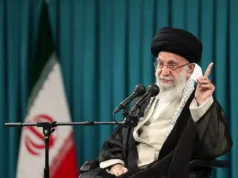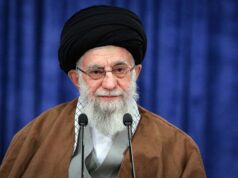As part of a nationwide “Islamofascism Awareness Week,” the Viking Conservatives brought in Jonathan Schanzer, the Director of Policy at the Jewish Policy Center, to give a speech entitled, “Radical Islam and the War on Terror.” To be honest, I was a little apprehensive going into the speech, but I walked away from the speech more than pleasantly surprised. Schanzer proved himself to be incredibly well-spoken, extremely knowledgeable and uncommonly rational. He laid out a problem and offered plausible ideas towards a solution. He cool-headedly handled provocations from pesky townies. I can easily say that it was the one of the best speeches I have attended in my short Lawrence career.
I agreed with 90 percent of what Schanzer had to say, so I will be using this editorial to add my own opinions to some of Schanzer’s bigger points. On another side note, though I have mixed feelings about the term “Islamofascism,” I will use it for the sake of convenience.
Schanzer began his speech by stressing the importance of events like this to raise awareness of this issue — Associate Professor of History Jerald Podair prefaced the speech in his introductory remarks by identifying militant fundamentalism as the greatest ideological threat to America in the new century. Though I would have to say that global warming presents a graver danger overall, I agree with both Schanzer and Professor Podair as well.
Schanzer proceeded to critique radical Islam and its role in some Middle Eastern governments while clearly differentiating between extremist and moderate Islam.
The best part of Schanzer’s speech was his three-pronged list of solutions. His first piece of advice was starting dialogue about the nature of the issue, saying that a good starting point would be to identify the “enemy.” This would have been great advice to hear before we invaded Iraq. Not only was Saddam Hussein not the enemy — he was indubitably a harsh dictator, but ran a secular government that had nothing to do with 9/11 or al-Qaeda — but his removal and more importantly the reconstruction of Iraq, is draining our military resources and taxpayers’ money. In a serious irony, a 2006 National Intelligence Estimate said that the American invasion and occupation of Iraq has been a “cause célèbre” for “jihadists” around the world. By dismantling the Hussein regime, we have also eliminated Iran’s biggest rival in the region and replaced it with a fragile government that is Shia-dominated and, by extension, ally with Iran, a theocracy — what some say is the center of “Islamofascism” — and a significant financial supporter of terrorist organizations such as Hezbollah and Hamas.
Schanzer placed the most importance on his second solution: “If radical Islam is the problem, then moderate Islam is the solution,” he repeated throughout the address. He called for greater publicity and support for moderate Muslims who favor democracy and condemn violence in the name of religion, expressing a need for Muslim leaders in the vein of Martin Luther King Jr.
His third big point was that deterrence needs to be used more effectively and more frequently in regards to combating radical Islam, listing a string of occurrences since 1979 where the United States has not held its ground in the face of radical Islam, and admitted that policy blunders have been made, such as the CIA’s support of Osama Bin Laden in Afghanistan during the ’80s.
The Bush Administration’s response to terrorism since Sept. 11, 2001, has done little to discourage militant Islamists. We invaded Afghanistan, but due to a lack of ground forces in the Battle of Tora Bora failed to catch Osama Bin Laden; “Alec Station,” the special CIA unit dedicated to gathering intelligence on Bin Laden since 1996, has been shut down now for more than a year. We proceeded to invade Iraq on bad intelligence, or more accurately, bad intelligence-interpreting practices. Both countries continue to require American support but are still far from being autonomous and/or stable. These failures coupled with Israel’s less-than-successful incursion against Hezbollah in the summer of 2006 have not exactly struck fear into militant Islamists’ hearts. It is important to note, however, that more than a few terrorist plots have been foiled and that there have been no major attacks on U.S. soil since Sept. 11.
One recent success, Schanzer noted, was Israel’s elimination of what appears to have been a Syrian nuclear site. The Sept. 6 air raid sent clear signals to Iran, which is still pursuing nuclear weapons themselves, according to Western officials.
The biggest fault I could find with the speech was that Schanzer did not go into greater depth about how to deal with militant Islamists, seemingly leaving only military options as a proper response. However, Schanzer’s speech was unique in its practical approach in combating radical Islam as well as its clarity and clairvoyance.





